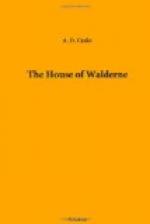The morning came, so long looked for, and with a strange feeling Martin arose with daybreak from his couch, and looked from his casement upon the little world he was leaving. A busy hum already ascended from beneath as our Martin put his head out of the window; he heard the clank of the armourer’s hammer on mail and weapon, he heard the clamorous noise of the hungry hounds who were being fed, he heard the scolding of the cooks and menials who were preparing the breakfast in the hall, he heard the merry laughter of the boys in the pages’ chamber. But soon one sound dominated over all—boom! boom! boom! came the great bell of the chapel, filling hill and dale, park and field, with its echoes. Father Edmund was about to say the daily mass, and all must go to begin the day with prayer who were not reasonably hindered—such was the earl’s command.
And soon the chaplain called, “Martin, Martin.”
“I am ready, sire.”
“Looking round on the home thou art leaving, thou wilt find Oxford much fairer.”
“But thou wilt not be there.”
“My good friend Adam will do more for thee than ever I could.”
“Nay, but for thee, sire, I had fallen into utter recklessness; thou hast dragged me from the mire.
“Sit Deo gloria, then, not to a frail man like thyself; thou must learn to lean on the Creator, not the creature. Come, it is time to vest for mass. Thou shalt serve me as acolyte for the last time.”
People sometimes talk of that olden rite, wherein our ancestors showed forth the death of Christ day by day, as if it had been a mere mechanical service. It was a dead form only to those who brought dead hearts to it. To our Martin it was instinct with life, and it satisfied the deep craving of his soul for communion with the most High, while he pleaded the One Oblation for all his present needs, just entering upon a new world.
The short service was over, and Martin was breakfasting in the chaplain’s room with him and Hubert, who had been invited to share the meal. They were sitting after breakfast—the usual feeling of depression which precedes a departure from home was upon them—when a firm step was heard echoing along the corridor.
“It is the earl,” said the chaplain, and they all rose as the great man entered.
“Pardon my intrusion, father. I am come to say farewell to this wilful boy.”
They all rose, Martin overwhelmed by the honour.
“Nay, sit down. I have not yet broken my own fast and will crack a crust with you.”
And the earl ate and drank that he might put them all at their ease.
“So the scholar’s gown and pen suit thee better than the coat of mail and the sword, master Martin!”
“Oh, my good lord!”
“Nay, my boy, thou wast exiled from home in my cause, and I may owe thee a life for all I can tell.”
“They would not have harmed thee, not even they, had they known.”




